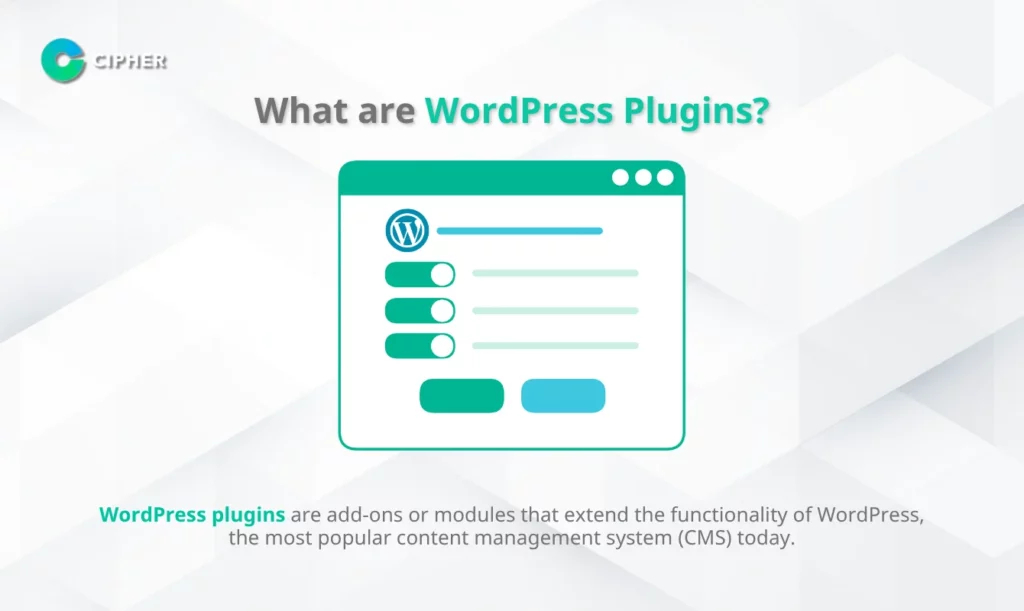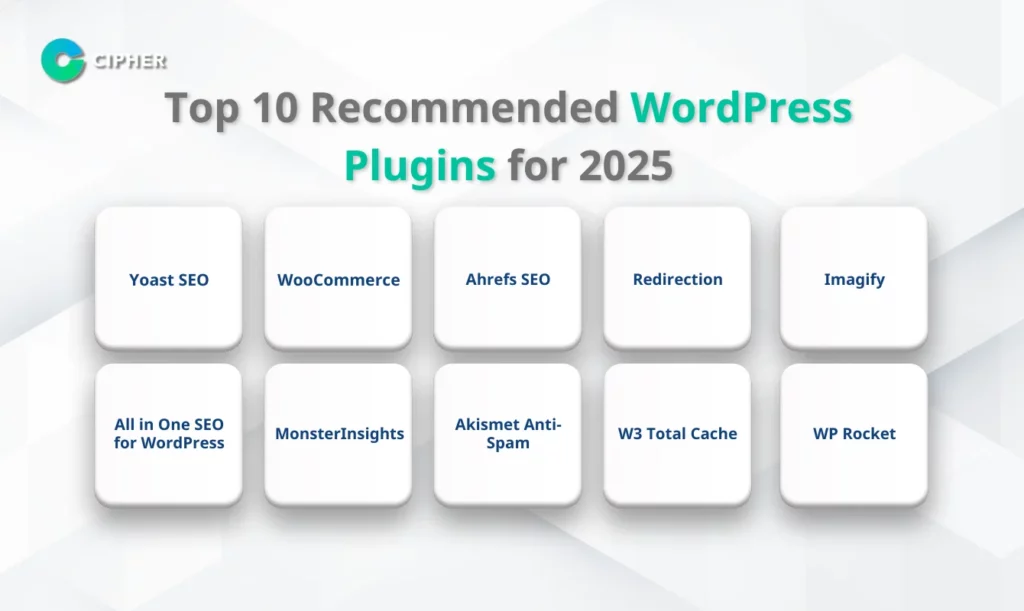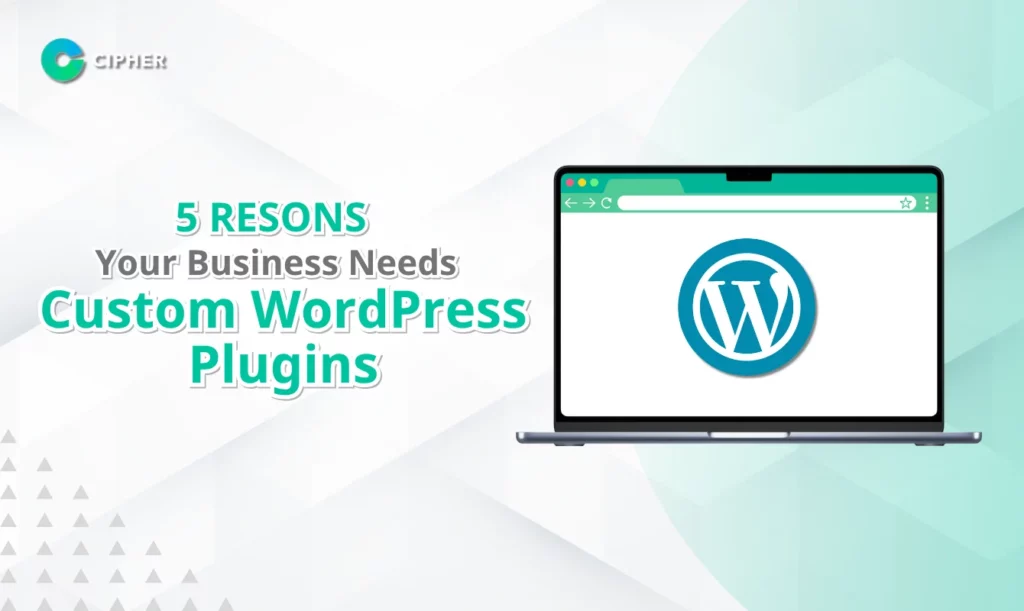Table of Contents
In the world of WordPress, there are countless plugins available. Some may think that off-the-shelf plugins are sufficient for their website. However, developing custom WordPress plugins is often a better choice for businesses. At Cipher, we’ve compiled 5 crucial reasons your business should have custom WordPress plugins to drive your online venture further.
What are WordPress Plugins?

5 Reasons You Should Have Custom WordPress Plugins
1. Functionality That Meets Your Specific Needs
2. Enhanced Security
3. Seamless Integration with Business Systems
4. Flexibility to Customize and Extend
5. Competitive Advantage in Business
How Do WordPress Plugins Work?
Fundamentally, plugins are sets of programs or functions developed to work with a core system, in this case, WordPress. Most WordPress plugins are developed using PHP, which is also the primary language of WordPress.
Once installed and activated, a plugin works in tandem with WordPress based on the conditions defined in its code. For instance, when someone visits the website, the plugin may record the visit data. Or, when new content is posted, the plugin automatically shares it on social media. This allows WordPress to have expanded capabilities controlled by the plugins.
How Do WordPress Plugins Affect SEO?
Numerous WordPress plugins are developed to help websites rank better on search engine results pages (SERPs), which is a key goal of SEO. These plugins offer features for on-page SEO, such as optimizing titles, meta descriptions, headings, and image alt texts for the targeted keywords of each web page.
Additionally, there are WordPress plugins that assist with technical SEO aspects like generating sitemaps, correctly redirecting old pages to new ones, enabling AMP content, improving website loading speed, and more. These are crucial factors in Google’s ranking algorithm. Thus, having good SEO WordPress plugins can increase your chances of ranking on the first page.
How to Install WordPress Plugins
Installing plugins in WordPress is straightforward via the admin dashboard. Here are the main steps:
- Log in to your WordPress admin dashboard.
- Navigate to the Plugins menu and select Add New.
- Search for the desired plugin by entering keywords, selecting categories, and clicking the Search button.
- Choose the plugin you want to install, read the details and reviews carefully, then click the Install Now button.
- Wait for the installation process to complete, then click Activate to start using the plugin.
- Configure the plugin settings through its menu (if available) according to your preferences.
If you have a plugin in a .zip file downloaded from another site, you can install it by choosing Upload Plugin in the Add Plugin menu and dragging the .zip file in. Installing via FTP is slightly more complex – you need to upload the plugin folder to the wp-content/plugins directory and then activate it from the admin dashboard as usual.
Top 10 Recommended WordPress Plugins for 2025

1. Yoast SEO
2. WooCommerce
3. Ahrefs SEO
4. Redirection
5. Imagify
6. All in One SEO for WordPress
7. MonsterInsights
8. Akismet Anti-Spam
9. W3 Total Cache
10. WP Rocket
Tips for Choosing Quality WordPress Plugins
Choosing Free Plugins
- The high number of active installations indicates wide usage
- Average rating of 4-5 stars
- Updated within the past year, compatible with the latest WordPress version
- More 5-star than 1-star reviews
- Responsive developer support in forums
- Detailed documentation or user guide
Choosing Premium Plugins
For paid WordPress plugins, in addition to the above criteria, consider these aspects:
- Reputable developer, well-known company, or individual
- Money-back guarantee or free trial period
- Reliable support via tickets, live chat, or phone
- Features essential and beneficial for your business
- Reasonable price for the value, subscription, or one-time fee
Before purchasing, compare several similar plugins, read user reviews on the website, YouTube, and social media to gauge satisfaction levels and potential issues. This helps you choose with more confidence.
Free vs Premium Plugins: What's the Difference?
Free Plugins
- No cost to use
- Basic features may not cover advanced usage
- Infrequent updates, some may be abandoned
- Slower issue resolution due to fewer developers
- May display ads or links to paid plugins
Premium Plugins
- Require payment, one-time or recurring subscription
- More diverse and in-depth features to better suit businesses
- Regular updates and new versions
- Dedicated support team for faster troubleshooting
- No ads, only relevant functionality
Develop Your Custom WordPress Plugin with Cipher Today!
At Cipher, we have a professional team ready to provide custom WordPress plugin development services that fully meet your business needs. Whether it’s plugins for SEO, membership systems, e-commerce management, or any other functions, we use modern technologies and standardized workflows to ensure your plugin is stable, secure, and always delivers a great user experience.
No matter if you own a small, medium, or large website, we offer cost-effective services with long-term support and consultation to give your business an edge in the online world. Contact us today through various channels – our team is happy to serve you.
Conclusion
How are custom WordPress plugins beneficial? In WordPress, plugins play a vital role in extending capabilities, adding features, and improving website performance. However, generic, ready-made plugins may not fully serve business requirements.
Developing custom WordPress plugins is a better option. It provides features tailored to your needs, enhanced security and efficiency, seamless integration with other systems, and room for future customization and scaling. This helps your business gain a stronger competitive advantage.
If you recognize the importance of WordPress plugins for online business and want high-quality plugins to develop your website, consider consulting with the expert team at Cipher. We’re ready to help you develop the best WordPress plugins and drive your online business to grow with maximum efficiency. Our professional team has extensive experience in developing WordPress plugins for various businesses.
FAQs
What are the main functions of WordPress plugins?
Plugins are add-ons that extend the capabilities of WordPress, enabling it to perform a wider range of tasks. These include adding features, customizing appearance, and enhancing the website’s performance. Plugins allow WordPress to support more diverse uses.
What WordPress plugins are essential?
Essential plugins span several categories, such as:
- SEO plugins: Yoast SEO, Rank Math, All in One SEO
- Website speed plugins: W3 Total Cache, WP Rocket
- Anti-spam plugins: Akismet, Antispam Bee
- Form plugins: Contact Form 7, WPForms
- Backup plugins: UpdraftPlus, BackWPup
- E-Commerce plugins: WooCommerce
However, if ready-made WordPress plugins don’t meet business needs, developing custom plugins is a better choice.
How can WordPress plugins be installed?
There are 3 main methods:
- Through the Admin Dashboard by searching for the plugin name and clicking install.
- Uploading the plugin’s .zip file via the Admin Dashboard.
- Uploading the plugin files via FTP to the wp-content/plugins folder.
What are the benefits of plugins?
- Expand WordPress capabilities to do more things
- Avoid having to write code, saving time and cost
- Wide selection of free and paid plugins for every need
- Easier website customization and management without programming
- A key factor making WordPress the top CMS
However, it’s best to use only plugins essential for your business to avoid impacting website speed.





